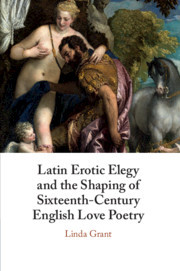Description
Latin Erotic Elegy and the Shaping of Sixteenth-Century English Love Poetry
Lascivious Poets
Author: Grant Linda
Interdisciplinary in approach and methodologically sophisticated, this book explores the dynamic reception of Latin erotic elegy in Renaissance love poetry.
Language: EnglishApproximative price 30.28 €
In Print (Delivery period: 14 days).
Add to cart
Latin Erotic Elegy and the Shaping of Sixteenth-Century English Love Poetry
Publication date: 07-2021
Support: Print on demand
Publication date: 07-2021
Support: Print on demand
Approximative price 107.80 €
In Print (Delivery period: 14 days).
Add to cart
Latin Erotic Elegy and the Shaping of Sixteenth-Century English Love Poetry
Publication date: 08-2019
270 p. · 15.8x23.5 cm · Hardback
Publication date: 08-2019
270 p. · 15.8x23.5 cm · Hardback
Description
/li>Contents
/li>Biography
/li>
How did Latin erotic elegy influence and shape sixteenth-century English love poetry? Using an interdisciplinary approach, this book offers detailed readings of poetry with close attention to the erotic, sometimes problematically 'pornographic', 'wanton' and 'lascivious' verse that exists in both periods. Moving beyond arguments that relate Renaissance eroticism more or less solely back to Ovid and Petrarch, Linda Grant breaks new ground by demonstrating the extent to which a broader sense of classical, specifically Latin, erotics underpins conceptions of sexual love, gender and desire in Renaissance literature. Methodologically sophisticated and moving away from static source study to the dynamism of intertextuality and reception, Grant shows the value of dialogic readings, exploring how elegy speaks to Renaissance poetry and how reading poems from both periods together illuminates both sets of verse.
Introduction: 'All that rout of lascivious poets that wrote epistles and ditties of love'; 1. 'Ovid was there and with him were Catullus, Propertius and Tibullus': transmission, teaching and receptions of Roman love elegy in the Renaissance; 2. 'For truth and faith in her is laid apart': women's words and the construction of masculinity in Catullus' Lesbia poems and Thomas Wyatt; 3. ''Fool', said my muse to me': reading metapoetics in Propertius 2.1 and 4.7, and Astrophil and Stella 1; 4. 'In six numbers let my work rise, and subside in five': authority and impotence in Amores 1.5 and 3.7, Donne's 'To his mistress going to bed', and Nashe's Choice of Valentines; 5. 'My heart … with love did inly burn': female authorship and desire in Sulpicia, Mary Sidney's Antonie and Mary Wroth's Pamphilia to Amphilanthus 1.
Linda Grant has been a Teaching Fellow and Visiting Lecturer in Renaissance Literature at Royal Holloway, University of London. She has also previously taught at Birkbeck College, University of London in both the English and Classics departments, and at Queen Mary, University of London. Her research focuses on Renaissance discourses of love and the erotic.
© 2024 LAVOISIER S.A.S.
These books may interest you

A Guide to Latin Elegy and Lyric 53.03 €




